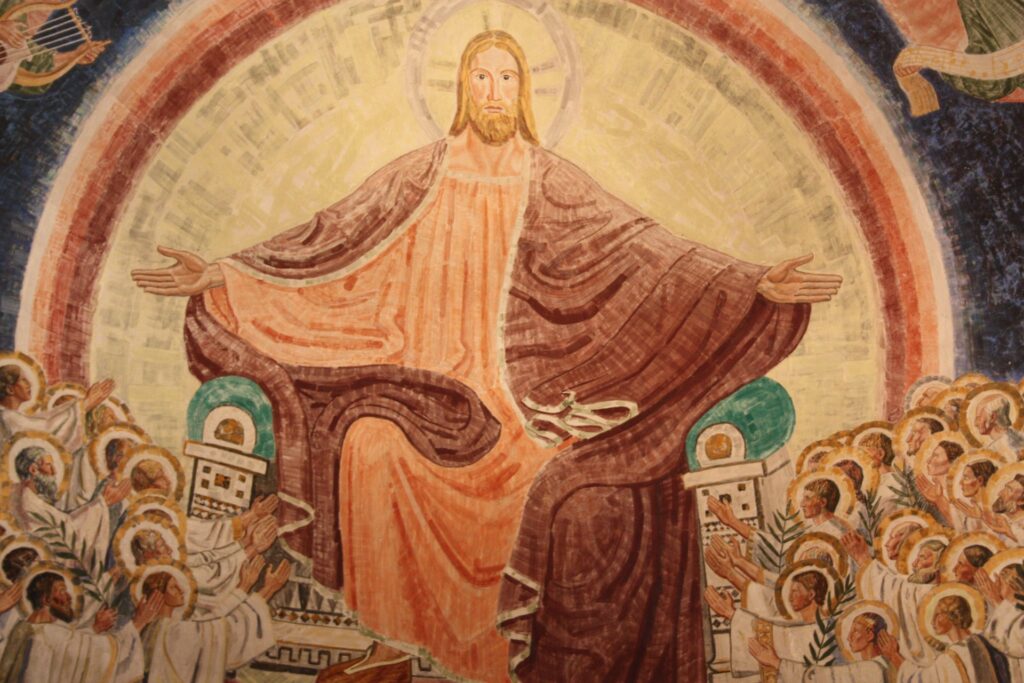
What Did Jesus Think About Himself?
We praise Jesus as God. We sing “All hail the pow’r of Jesus’ name! Let angels prostrate fall!” We take the Lord’s Supper during which we remember Jesus’ death for our sins. We pray in his name.
But did Jesus really claim to be God? Many modern critics would have us answer “No.”
- They attempt to uncover in the Gospels the “historical Jesus.”
- They see much of the Gospels as legend, and they attempt to get at the real story. They attempt to find the words we know Jesus said. They attempt to find the deeds we know Jesus did.
Regardless of what these critics attempt to accomplish, the Gospel records exist.
- These Gospels were written shortly after Jesus’ earthly life and ministry.
- These Gospels were written before legends really had the time to evolve.
- These Gospels were written when eye-witnesses to these events were still living.
Let’s examine the Gospels and see if Jesus really claimed to be God.
Jesus Claimed to be the Son of Man
Jesus’ title “Son of Man” goes far beyond claiming his humanity.
In a vision of Daniel, Daniel saw the Son of Man coming and receiving dominion, glory and a kingdom (Dan. 7:13-14).
Throughout the Gospels Jesus claims to be the Son of Man. For example, when speaking of his coming death, Jesus said, “The Son of Man is about to be betrayed into the hands of men” (Matt. 17:22). Notice Jesus did not say, “A son of man.” Had Jesus merely said “a son of man,” he would merely have been claiming to be a human being. But, using “the Son of Man” he equates himself with the Son of Man in Daniel.
Jesus Claimed to Have Authority
When discussing the Law, rabbis would often quote one another for authority.
Jesus, however, refers to himself as one having authority. For example, when Jesus spoke about hatred in the Sermon on the Mount, he said, “You have heard it said…but I say to you” (Matt. 5:21-22). Six times in the Sermon on the Mount, Jesus uses this formula. Jesus was sitting aside the Law of Moses and claiming to have superior authority to it. Jesus taught as one having authority, not as the scribes (Matt. 7:28-29).
Many Jews refuse to follow Jesus today because he claimed to have the same (if not more) authority than Moses’ law.
Jesus Claimed to Have Authority to Forgive Sins
Jesus forgave a paralytic and said, “The Son of Man has power on earth to forgive sins” (Mk. 2:10). The crowd present asked, “Who can forgive sins but God alone?” (Mk. 2:7). That is exactly the point-No one but God can forgive sins. Since Jesus had the authority to forgive sins, he is divine.
Jesus Accepted Testimony as God’s Son
When individuals claimed he was divine, Jesus agreed with them. When Peter confessed his faith in Christ as the “Son of God,” Jesus responds by blessing Peter (Matt. 16:17). When the high priest asked Jesus if he were the Christ, Jesus replied, “I am” (Mk. 14:61-62). The high priest tore his clothes in dismay, because he thought Jesus had blasphemed. By custom, the high priest was not to rend his garments for personal trouble–He could only rend his garment when acting as a judge and blasphemy was uttered in his presence.
The Jewish people understood that Jesus claimed to be God–While he was being crucified, the crowd taunted him with “Let [God] deliver Him now if He will have Him; for He said, ‘I am the Son of God” (Mt. 27:43).
The inscription above Jesus’ cross read: “This is Jesus the King of the Jews” (Matt. 27:37)–Either Jesus claimed to be King of the Jews or someone mistakenly thought Jesus made that affirmation.
Jesus Claimed to Determine People’s Destiny Before God
If one confesses Christ, he will confess that one before the Father. If one refuses to confess Christ, he will deny that one before the Father (Lk. 12:8-9).
“Therefore I said to you that you will die in your sins; for if you do not believe that I am He, you will die in your sins” (Jn. 8:24).
Jesus Accepted Worship
When individuals would worship Jesus, he accepted their worship.
- A leper came and worshipped Jesus (Matt. 8:2).
- The blind man Jesus healed worshipped him (Jn. 9:35-39).
- When Jesus calmed the sea, the disciples worshipped him (Matt. 14:33).
- One commandment was to have no other gods beside the Lord God (Ex. 20:3).
When beings less than God were worshipped, they refused the worship. When Cornelius worshipped Peter, Peter replied, “Stand up; I myself am also a man” (Acts 10:25-26). John worshipped the angel who showed him Revelation. The angel stopped him saying “Worship God” (Rev. 22:8-9).
Jesus instructed the disciples to pray by his name (Jn. 14:13-14).
Jesus Claimed to be Jehovah
When Moses inquired about God’s name, God replied “I AM” (Ex. 3:14).
Jesus claimed to be the “I AM” (Jn. 8:58). We know this is what Jesus meant by the reaction of the multitude. They picked up stones to stone him, because they believed he had blasphemed.
Jesus Claimed to be Equal with the Father
Jesus claimed that he and the Father were one (Jn. 10:30). The Jews picked up stones to stone him, because he had made himself God (Jn. 10:33).
Conclusion
Jesus told his disciples to believe in him (Jn. 14:1). Do you believe in him? What will you do with Jesus?
This sermon was originally preached by Dr. Justin Imel, Sr., at the Alum Creek church of Christ in Alum Creek, West Virginia.





